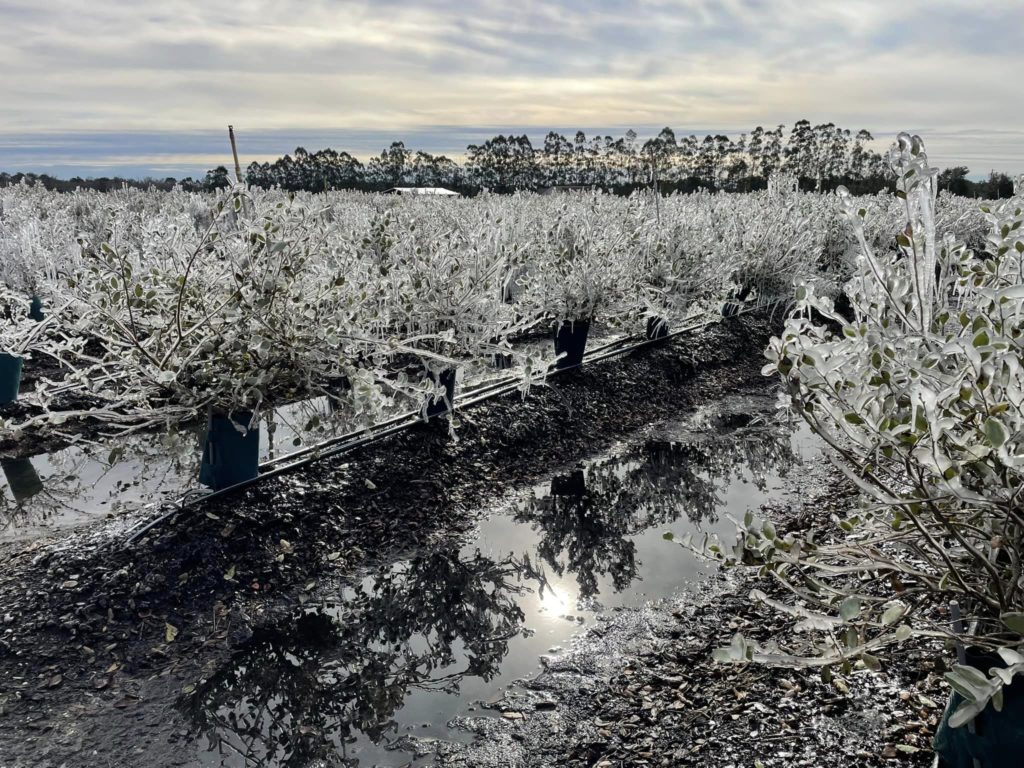By Clint Thompson
Consecutive nights of sub-freezing temperatures has Southeast specialty crop producers concerned moving forward this year.

Vegetable growers are worried about potential injury to their fruit that were vulnerable in the ground. Strawberry farmers are concerned about wind damage to their crop. Georgia’s Vidalia onion producers are concerned now about the long-term ramifications for their young plantings that have not been in the ground very long.
The anticipated winter storm lived up to the fears that growers had heading into the weekend, said Chris Butts, executive vice president of the Georgia Fruit and Vegetable Growers Association.

“The guys with the winter crops in the ground, broccoli and greens, we think those will be a total loss,” Butts said. “Our onion guys I think are cautiously optimistic that they’ll come through without significant damage. Our peach and blueberry guys are worried. It’ll take some time to see exactly what kind of long-term damage they may have. But they were cautiously optimistic, too.
“The only silver lining is it happens at a time when we’re between most of our major crops which is a blessing.”
Farmer Testimony
Bill Brim, part owner of Lewis Taylor Farms in Tifton, Georgia, had crops that were especially susceptible to temperatures that reached as low as 18 degrees Fahrenheit in Tifton, Georgia Saturday morning and stayed below freezing on Saturday night and Sunday night.

“We’re probably going to lose everything we had out in the open; all the collard, kale and turnips and mustard. I don’t know what the (strawberries) are going to look like,” Brim said. “It put a hurting on us I’m afraid. Until it really thaws out and the sun comes back out, you really can’t tell a whole lot. But you can see how it’s slopped, and the cabbage was frozen (Sunday). It’s pretty rough.”
Brim said small fruit were on the strawberry plants, though they wouldn’t have been harvested at this point in the season.
“We covered them up and did everything we possibly could to save them, but we probably won’t know anything until Thursday about how bad it is, and we get some weather that will let us thaw out a little bit,” Brim said. “It’s going to be pretty rough, but we’ll just keep fighting the fight and keep going.”
Impact in Florida
The negative impact of the frigid weekend was not isolated to just Georgia farmers. Florida producers felt the sting of below-freezing temperatures as well. Temperatures reached the 20s in Plant City, Florida, where there is a lot of strawberry production vulnerable.
Temperatures dipped into the 30s further south in the Labelle/Immokalee areas, said Gene McAvoy, University of Florida/Institute of Food and Agricultural Sciences regional vegetable Extension agent IV emeritus.
“Around Immokalee and Labelle, 37 (degrees Fahrenheit) was the lowest we saw. We didn’t have frost or anything like that,” McAvoy said. “The first day it was 37 and (Sunday) it was 37 again. (Sunday night) it went down to about 39 around 10 p.m. and started coming back up. It’s 40 to 42 (Monday morning).”
South Florida growers are producing a little bit of everything this time of year, including tomatoes, peppers, cucumbers, squash, herbs, cabbage and kale.
“It might slow (the crops) down a bit,” McAvoy said. “It’s unusual that we’d have four days in a row that are this cold. Usually when we get cold, it’s a day or two and then it’s back up in the 70s. Plus, it’s been real cloudy. We haven’t had a bit of sunshine in four days.”
The Florida Blueberry Growers Association advised its growers to implement protection strategies against low temperatures and strong wind chill.
Doug Phillips, University of Florida Institute of Food and Agricultural Sciences (UF/IFAS) blueberry Extension coordinator, said it would be later in the week before he is able to gauge the impact from farmers. He described the potential impact that accompanies inclement weather like this past weekend.
“One concern is if it is windy during times of freezing temperatures, it can be difficult to get uniform coverage using overhead irrigation to freeze protect,” Phillips said. “Another is back-to-back nights of freeze protecting with overhead irrigation can create conditions that are favorable for botrytis infection.”









